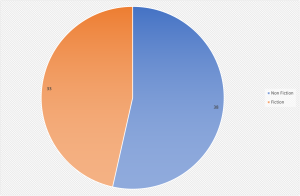Posted late, because of the holiday weekend, but still here:
Article: “The Sad, Beautiful Fact That We’re All Going to Miss Almost Everything” by Linda Holmes
This article touches on a problem that I struggle with more or less constantly: accepting the fact that I will never read all the books, see all the films, listen to all the music that there is— not even all the really good, “important” stuff. Linda Holmes identifies two different strategies for dealing with this: “culling,” which involves artificially reducing the amount of stuff you are going to miss by designating whole categories—often themselves arbitrary— as less worthwhile; and “surrender,” which means accepting the impossibility of getting to it all and realizing that the effort of seeing/hearing/watching as wide and deep a selection of stuff as possible is really the point. Also makes the point that, really, if you COULD get to everything worth your time, that would indicate alack of interesting stuff in the world— which would be much worse that the fact that you will miss most of it.
Song: “Cartographist (Daedalus’ Pacific Labyrinth Mix)” by Purity Ring
I have been plugging Purity Ring and their recent album, Shrines, since late last year, and I will basically click on any link that mentions them. This is a remix of one of the album tracks, which dramatically alters the mood or feeling of the song— and, to be honest, uses it more as a point of departure than as the bedrock of something new. Still, I like it.
Article: “Beyond lies the wub: a history of dubstep” by Joseph Flatley
SPIN recently published a feature about dubstep (which you can read here) that more or less focused entirely on the expanding U.S. scene and artists like Skrillex and Bassnectar. Weirdly, this piece, form a technology website, does a much better job of actually tracing the development of the genre, and dealing with the departure of (much) U.S. dubstep from its U.K. roots. I don’t end up agreeing with the author’s taste, but he at least makes an effort to figure out how the music has diversified over the last decade or so.
Also, the piece mentions Mary Anne Hobbes extremely influential BBC One special “Dubstep Warz,” which was central to bringing dubstep into the mainstream (in the U.K., anyway). It features many of the most important early players, and you can listen to the whole thing here, if you want a sense of what this stuff actually sounds like (and how far people like Skrillex depart from this earlier sound):
Article: “A Critic’s Manifesto” by Daniel Mendelsohn
A beautiful and impassioned explanation of what it is that criticism, when it is working, is supposed to do: “o recreate on the page the drama of how they had arrived at their judgments.” Criticism is not really about telling you if something is “good” or not; it is supposed to provide an example of one person thinking through some kind of cultural experience. When it succeeds, this both helps us to figure out to come to terms with what we are seeing/hearing/reading, and tells us about how it is possible for other intelligent people to think of things in a completely different way from our own— which is a skill that many of us nee to work on.
Articles: “The Last Critic Turns 100” by Adam Kirsch and “Built to Last” by M.H. Abrams and Stephen Greenblatt
Meyer Howard Abrams, the first general editor of the Norton Anthology of English Literature, recently celebrated his 100th birthday, which has prompted reflection on the anthology, the idea of a canon, and the place of English literature in today’s society. The first piece, from The Tablet, is a detailed look at Abrams himself and his work as a scholar of literature, and the Romantic period in particular; the second is a conversation between Abrams and Stephen Greenblatt, the current general editor. Both are interesting, but the Tablet piece really makes a case not only for Abrams as more than a compiler of literature, but for the importance of Romanticism to the history of ideas generally.


